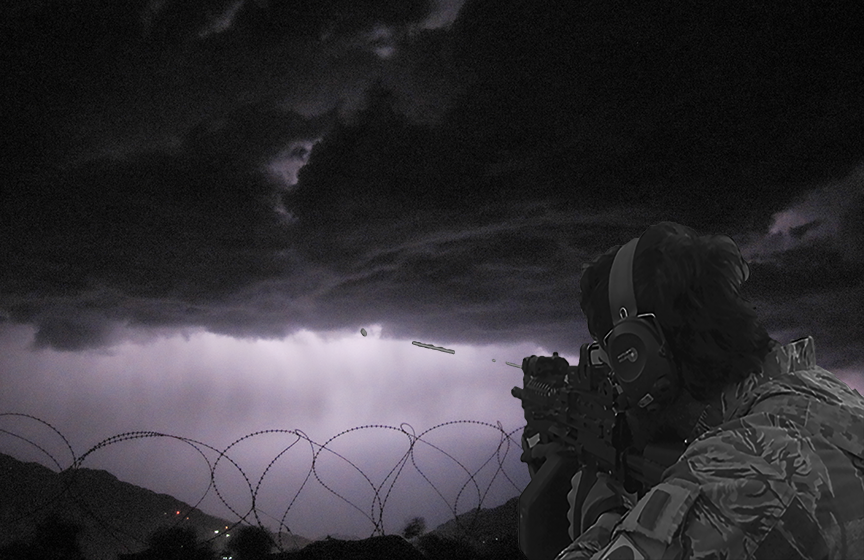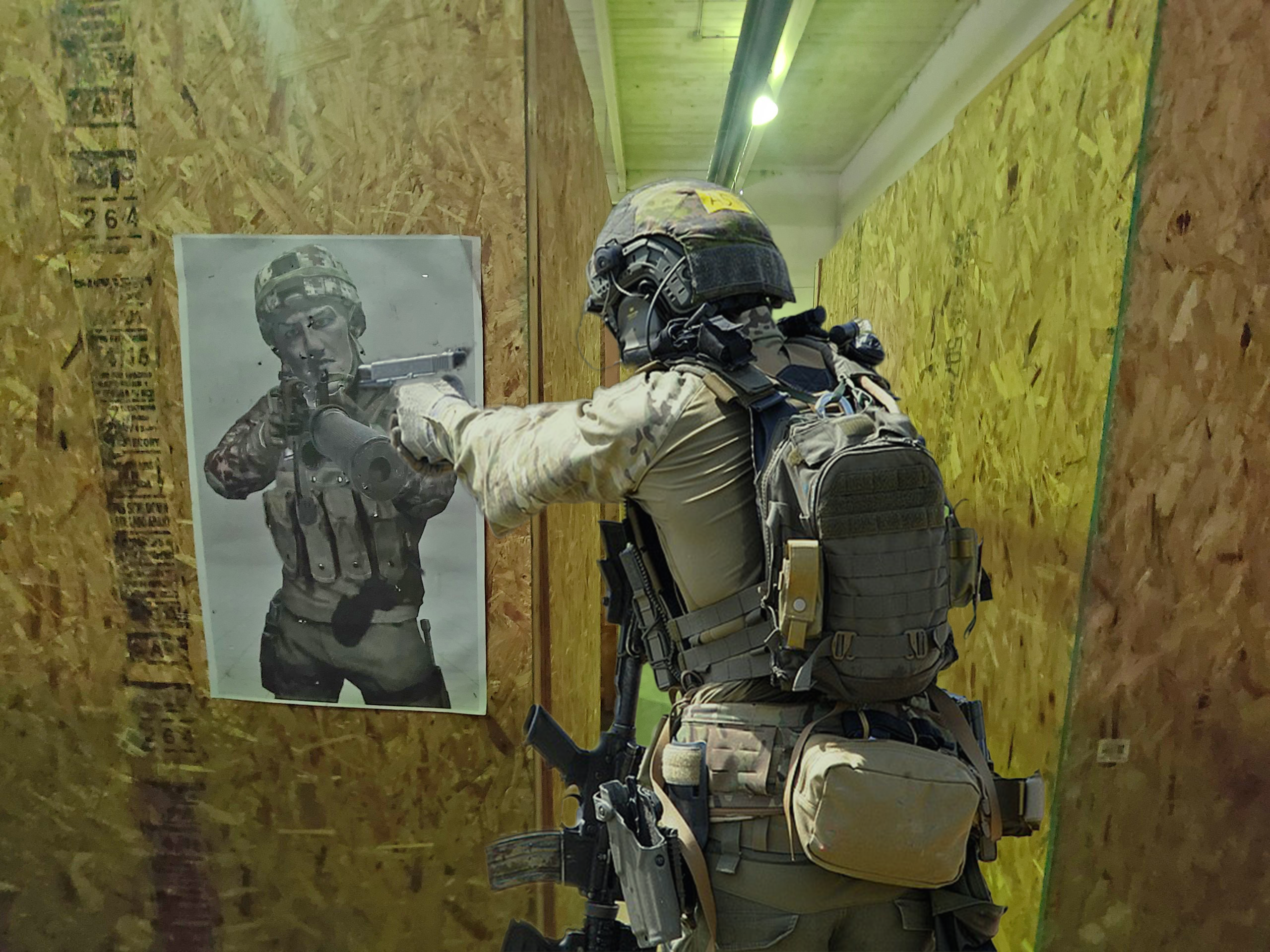(Author) Long before I became aware of the term Flow State, I was a Navy SEAL who strived to win and be better than my teammates at virtually everything we did. At a certain point in my career I realized that trying harder to win at a particular shooting drill, just resulted in degraded performance and more stress. I'm recalling a particular day on the range when we were pairing up to see who the best at a particular shooting drill.
I was the Leading Petty Officer of the platoon and felt a responsibility to lead by example and be better than the guys who had less experience. What I found was that the harder I tried to win, the worse I did. Over the course of running this shooting drill I became quite frustrated with my own performance. During the last opportunity to redeem myself on this drill I got internal and relaxed. I did significantly better on that iteration and learned a valuable lesson that day which stuck with me through the rest of my career. Relax and clear the mind of all external thoughts and pressures to win. The objective was simply my own optimal performance, whatever that may look like. While I was still interested in winning against another, I was more interested in my own good performance. Getting internally focused on my own process movement was the key that opened the door.
Years later, I was required to deal with a knife threat inside a moving vehicle. By now, I had fully implemented what Dwain Dieter had taught me years ago, which was that reaction times are even faster when we're relaxed. I was informed that at some time the asset seated next to me in the rear seat would produce a knife and attempt to stab either myself, the driver or the passenger up front. I was also required to subdue or eject the asset from the moving vehicle. The vehicle began to slowly drive around a small track and after a few minutes of driving the asset produced a knife and attempted to stab the right front passenger by reaching around his chest with the knife. I responded with a few well-placed strikes and ejected the asset from the moving vehicle. As if it may have been a fluke, the instructors ran the drill again, however this time the asset attempted to stab me with the knife. My response was just effective as the first. In relating this experience to this post I think extensive training and prolonged exposure to high stress situations had combined to create a Flow State. Training and experience facilitated confidence, which allowed me to remain relaxed and calm, which facilitated an effective reaction.
The Flow state is not a sudden manifestation of hidden superpowers, but rather a product of intensive training and mental conditioning.
During my time in government service there was nothing that demanded a Flow State more than performing Close Quarters Combat (CQC). All the attributes that encourage a Flow State are demanded in large portions when performing CQC. However, to get to the Flow State was many hours of long arduous work. Before a SEAL platoon steps inside a Shoot-House, they'll have spent at least 40 hours on the range tuning up rifle and pistol skills. As a team, when they begin doing their first Shoot-House runs together there will be lots of mistakes. But, after another 80 hours of running through the Shoot-House they will be flowing.
Once the team is jiving properly it's an impressive thing to watch a SEAL platoon from the catwalk above. Weapon manipulation, round placement, footwork, communication, self-awareness, team awareness, mindfulness, self-control, aggressiveness, courage, and a clear mind; all these attributes and emotions combine together to create a powerful cohesive unit, of which, everyone is operating in a Flow State. Everyone knows exactly what they are doing and everyone is flowing. But it took many long hours of work to get there. The point is, the true Flow State will come as a result of many hours of hard work and the right attitude.
Athletics and Flow State
One athlete described the Flow State like this, "I allowed myself to fully express all the training I had undergone with my trainers. I had no inner critic distracting my movements, I was completely dissolved into the movements. I was at a "one" with my opponent, in the zone. I was in the Flow State at the peak of my performance.
Commonly, athletes describe the sensation of time slowing down when they talk about being in “the zone.” Also, characterized by deep concentration, highly efficient performance, emotional buoyancy, a heightened sense of mastery, a lack of self-consciousness, and even self-transcendence.
How can you potentially recreate the conditions associated with flow, at will? Only a few sports athletes, and soldiers have the mental ability to enter the flow state at will. An ability to do so is associated with having a disciplined, focused mind. A focused mind is essential to optimal human performance and can be developed through meditation.
Many, meditate for spiritual reasons, however regardless of intention the pure essence of meditation remains the same for everyone, which is mastering thy self. This is done by striving to extinguish thinking, about anything. I meditated for 30 years before it became spiritually motivated. I would often focus upon a white piece of paper, slow and control my breathing, while feeling myself relax deeply. This assisted in falling asleep or even replacing sleep. As breath is vital to life controlling ones breathing while meditating is essential. There are many different techniques for breath control, starting out, try maintaining slow and deep rhymical breathing. Striving to not think strengthens the mind like lifting weights does for the muscles. There is a reason so many people believe in meditation, most will report that meditation clears out the cobwebs and cleans up the processes of the mind. Reducing clutter and random thoughts allows you to focus your mind more deeply than it could previously.
The Flow State Mindset
Things leaned in a certain state of mind are best recalled in the same state of mind. For example, if you went to class drunk every day, you should take the exam for the class, drunk. Therefore, the mindset you are in during your training should resemble the mindset you want to be in during the real thing.
There is a certain balance required mentally to achieve a Flow State, whether that be in sports, or in combat. Fear is seldom an obstacle during a sporting event, but it is certainly an issue in combat. The fear must be overcome. Overcoming fear will allow you to make better decisions and it's crucial to achieving the flow state in combat. Operating in a flow state in combat is substantially more difficult than operating in a flow state during an athletic event, because fear will prohibit the Flow State from existing. Have you ever opened an app that allows you to see what percentage of the CPU is being used by other apps? For example, the mail app may using 8% of the CPU while pages open on the internet browser are using 72%. Imagine fear is taking up 72% of your processor, that doesn't leave much processing speed to focus and respond to the situation.
Other emotions identified as potentially inhibiting the Flow State are, panic, anger, hatred, depression, blame and regret. For example:
- You're blaming yourself for a goal you just missed, or for something horrific that just happened and your blaming yourself. Whatever it is, blame is consuming your present thoughts. Releasing yourself of blame so you can perform may mean the difference in your own survival.
- A regret over (something) is consuming your present thoughts.
- Depression, or grief consumes your thoughts, thus inhibiting flow.
There is theme here, essentially, any thoughts not directly related to the situation at hand are a distraction from the situation at hand. Also, thoughts that are not positively orientated may inhibit Flow State.
Emotions that may encourage Flow State are:
- Courage - putting yourself in harms way to protect another, or for the good of the team.
- Confidence - WIN, dominate, overcome.
- Aggressiveness - exerting your will over the situation.
- Teamwork - there is no "I" in team.
- A controlled mind - controlling your emotions in the heat of the action, remaining cool, calm and collected.
- mindfulness - being aware of yourself and others in the heat of the moment
- Reason - not acting hastily, or jumping to conclusions, using "reason" to assess the situation.
- Joy - they just scored and a team gets on a roll, becoming better and even harder to beat.
- Love - the Love for his fellow teammates caused Michael Monsoor to jump on the grenade; posthumously awarded the Medal of Honor. He was in Flow State, never taking his eyes off the grenade as he followed it to the ground. It was a state of mind he was in prior to the grenade hitting him in the chest that caused him to react the way he did. In the Flow State we make amazing decisions quickly, without hesitation and perform amazing athletic feats.
Remarkably, the emotions that encourage a Flow State are also associated with the higher realms of consciousness, as described by Dr. Hawkins. Could it be that the path to achieving our highest athletic and highest spiritual potential are very similar paths?



Leave a comment
This site is protected by hCaptcha and the hCaptcha Privacy Policy and Terms of Service apply.